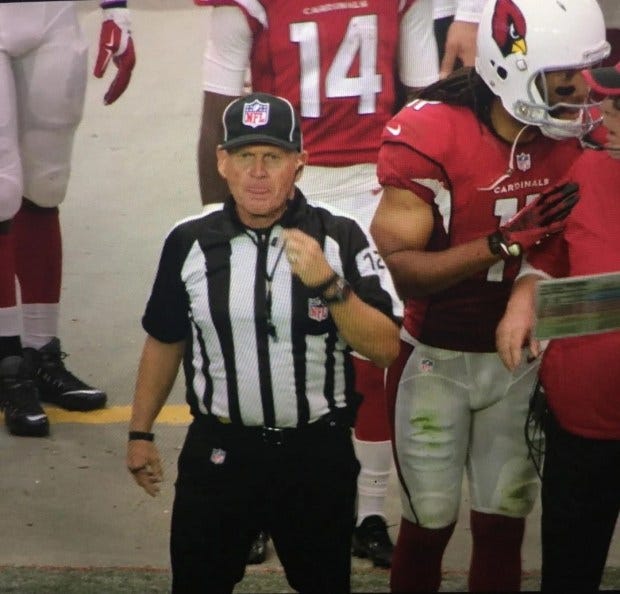Long time Newport Beach resident Laird Hayes and I have been friends for more than 40 years. When we first met, Laird was officiating high school football games. Over time, he advanced to the college level where he spent 13 years as an on-field game official working PAC-10 games and then it was off to the pros. During his 23-year career as an NFL side judge, Laird was assigned numerous playoff games and three Super Bowls.
Now retired, my good friend helps evaluate college officials who aspire to officiate in the NFL. We met days after John Gruden resigned as the head coach of the Las Vegas Raiders (see the photo below). Gruden's downfall was a result of his writing vulgar, disparaging emails about hiring female referees, gay players in football, Commissioner Roger Goodell's management of the NFL front office, and more. Here are some highlights of our conversation:
Q. Can you describe your love of football?
A. That's easy. My dad started the Quarterback and Receiver Camp in 1965. His first head coach was Benny Friedman, a former QB for the University of Michigan and the New York Giants. Initially, there were ten high school players at the first camp. At its height, there were six summer camps throughout the country from California to New Jersey. By the time my dad retired, thousands of QB’s and receivers had gone through his camps. I met most of them like NFL Hall of Famer James Lofton, as well as Doug Flutie, David Carr, John Lynch and Paul McDonald.
Q. You don't wake up one morning and say to yourself, "Next year I'm going to be an NFL official." What's the learning curve for a college ref to make it to the pros?
A. No you don't. You take it one step at a time. I did the best I could in the PAC-10 for more than a decade. If you think about it, unlike baseball or basketball where teams play year-round in youth, scholastic, college and recreational leagues, football is different. It's just one game a week from August through January which means there are fewer opportunities to work on your officiating skills. It’s on the job training from your very first game. My goal was to improve every game. I encouraged veteran officials to watch me officiate and critique my performance. A few days later we would meet and go over their copious notes. I tried to do this week in and week out. Just like the players who make the transition from college to the pros, officials have to make adjustments as well. That's because the game is quicker and there is more scrutiny at every level. The stakes are always high but they seem to be higher in the pros. The NFL rules are designed for the 32 teams, not hundreds of colleges. In order to make it in the pros, new officials need to learn what the NFL wants emphasized and what it wants called on the field. That's important because both change year to year and even sometimes during the season.
Q. I doubt many people know how many hours professional officials spend each week preparing for their next game. What does a typical week look like?
A. After every game, each official fills out his or her game report of the fouls called and the fouls not called. Those reports are forwarded to a former NFL official who’s been assigned to evaluate their game-day performance. It takes an average of five hours to watch video and “grade” a game because they are looking at every play, every call and every move you make on the field. Officials also take weekly rules tests. When I got the call that I’d been hired to officiate in the NFL, my mentor told me the first thing I needed to do was forget every rule I ever knew and memorize the NFL rulebook. That’s a bit of an overstatement, but his point was the pros have some rules and interpretations that are unique to the NFL. There are hundreds of exceptions to the rules at the professional level whereas in college there are far fewer exceptions. That's because they need to train thousands of officials rather than the 125 on-field officials in the NFL. My guess is most officials spend between eight to ten hours working on their craft Monday through Friday. And that doesn't include weekend prep for a game which might be in Chicago, Miami or New England, attending pre-game meetings Saturday night at the hotel, plus Sunday morning meetings at the stadium, officiating the game, and then flying home. In my case, I often would leave my house Saturday morning at 5:30 and arrive home late Sunday night or mid-morning on Monday. That's a long time to be away from home to officiate a three-hour football game … but worth every minute of it as there is nothing like the thrill of officiating an NFL game. Nothing!
Q. Growing up in the 1950s like we did, and playing sports in the '60s and '70s, did you ever think women were as tough and competitive as they are today?
A. When I was in high school, girls' basketball consisted of three dribbles and a pass. That's hardly the case today. Female athletes compete at the highest levels in basketball, volleyball, water polo, soccer, ice hockey, softball and many other sports. It's great to see teenage girls here in Orange County playing high school football. I'm so impressed with their determination, competitive spirit, and overall toughness. There's no question in my mind that these qualities run just as deep as any man's.
Q. Given what John Gruden recently said about female officials in the NFL, is there something inherent in the current process that makes it especially difficult for women to break into the college or pro ranks?
A. Let me say this about Gruden: I officiated many of his games and he always treated me with respect … although his language could be a bit "spicy" at times. His reportedly racist, homophobic and sexist comments, that recently were disclosed in emails, were ugly, deplorable and just plain wrong. People in leadership roles in football, and all sports for that matter, should do everything they can to weed out this kind of behavior. Coaches are first and foremost teachers. Do we want our children and young men and women to be taught how to hate someone because of a person’s skin color, religion, sexual preference or gender? Of course not. Regarding female officials, I never officiated any high school, college or pro games with a woman so I don’t have any first-hand experience. But what I can tell you is from what I’ve observed female officials have the ability to make split-second decisions on a court, diamond, ice rink or 100-yard playing field as well as any man I've worked with. There are only two women who currently officiate in the NFL along with approximately 100 females officiating the other levels of football. If they are deemed good enough, I am confident they will continue to advance. I expect there will be an increasing number of female officials working high school, college and the NFL games in the years to come.
Q. What advice do you have for anyone who aspires to become an NFL official?
A. I have a list a mile long but here are the basics: First, be passionate about the game; second, learn from your mistakes because you can't avoid making some; third, be coachable, by that I mean be willing to accept constructive criticism; fourth, realize that you are going to have to commit a lot of time learning the rules, mechanics and philosophy of whichever league you’re working in; fifth, be a low-maintenance official which means showing up on time, knowing the rules and keeping physically fit; sixth, make every effort to get along with the other officials you work with; and last, you must be thick-skinned. As a game-day official, you're not on the field trying to win a popularity contest. You are there to make the right call at the right time. According to the NFL, this happens 98.9 percent of the time.




